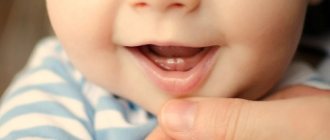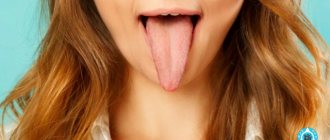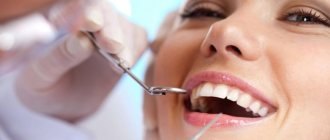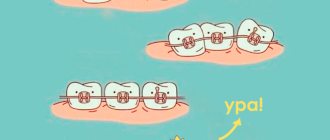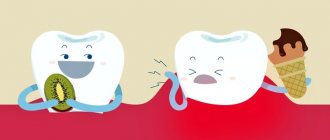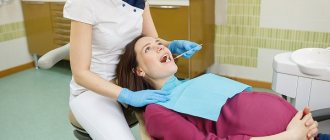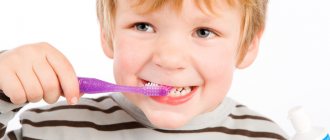Do adults have itchy gums? Itchy gums between teeth? What does it mean? We will take a detailed look at why gums itch and treatment methods at Elident dentistry.
When a person's gums itch, initially he does not attach much importance to it. Cause for alarm arises when severe itching and purulent lesions appear in the oral cavity. If you do not seek help in a timely manner, such discomfort can become a sign of a serious illness.
In most cases, the reasons that cause itching in the gums are due to either the presence of chronic inflammatory processes in the oral cavity, or are associated with the entry of a particular allergen into the body. In both situations, it is necessary to start treatment in a timely manner to avoid possible complications.
The Elident clinic employs competent specialists who apply an individual approach to each patient. Our dentists have extensive experience and are ready to conduct high-quality diagnostics, determine the cause of the disease as soon as possible and give you an accurate answer as to why an adult’s gums itch. Thanks to the deep theoretical and practical knowledge of our staff, the use of innovative equipment and quality materials, we are able to prescribe the correct treatment and guarantee quick results.
In this article you will find detailed information about why gums itch in an adult, and you will also learn how to deal with this phenomenon. We will also tell you who to contact if you have itching and other unpleasant sensations in the oral cavity.
Free consultation
Our specialists will conduct a free consultation and select the best treatment option for you.
Sign up now! Online registration
+7 (495) 649-41-19
Content
1 The main causes of itchy gums and itching
2 Inflammatory processes in the gum area - another reason to think
3 Chronic inflammation in the oral mucosa
4 Itching in the gums can occur due to poor-quality prosthetics
5 Allergies - itchy gums
6 Injury to the mucous membrane
7 Itchy gums during bruxism
What diseases cause itchy gums?
Itching in the gums can be caused by diseases:
- Gingivitis. One of the symptoms of the disease is that the gums itch and hurt due to bleeding. At the first signs, you need to contact your dentist for quality treatment.
- Periodontitis. Inflammation of the gums is accompanied by itching. A periodontist can help in this situation - it is extremely important to eliminate the cause of the disease, and not its consequence.
- Stomatitis. Both adults and children are susceptible to the disease. Why do the gums itch in this case? Ulcers form on them, which cause discomfort.
- Leukoplakia. Whitish spots appear on the mucous membrane, accompanied by itching. The disease often affects smokers.
Inflammatory processes in the gum area - another reason to think
One of the main causes of itchy gums in adults is associated with chronic gingivitis. As a result, the patient may experience the following adverse events:
- Bad breath;
- Bleeding occurs during hygiene procedures;
- The appearance of redness and swelling in the gum area;
- Cyanosis.
If itching in the teeth and gums is a consequence of periodontitis, then in addition to the above symptoms, the following may occur:
- Exposure of tooth roots;
- Discharge of pus from periodontal pockets;
- The appearance of mobility of dental units.
Itchy gums with periodontitis and gingivitis. What to do?
Initially, you need to contact an experienced periodontist. Since inflammatory processes in the gum area are caused by poor oral hygiene, which results in the appearance of various deposits on the surface of the teeth and gums. This allows you to get a clear answer to the question: “Why do my gums itch, hurt and bleed?”
This means that the main treatment procedures will be aimed at removing plaque and deposits from the surface of the teeth. Subsequently, therapy is prescribed, including the use of anti-inflammatory drugs (rinsing with antiseptic solutions, gel applications, etc.). That is, if itching of the gums occurs in adults, first of all you need to eliminate the causes, and only then begin treatment. Otherwise, anti-inflammatory measures will be ineffective.
Tooth itching during pregnancy
Women expecting a baby experience a whole range of unusual and sometimes unpleasant symptoms. In more than 50% of cases, expectant mothers experience gingivitis and bleeding gums. This is due to both changes in hormonal levels and a lack of certain substances in the body (for example, calcium), which in large quantities are used to ensure the normal functioning of the fetus in the womb. The enamel and hard tissues become thinner, and hyperesthesia appears.
Sometimes the symptom is associated with emotional stress. A pregnant woman is very worried about her baby, and constant stress, as we know, does not entail anything good. As a result, pathological processes such as caries, periodontitis, and pulpitis are diagnosed.
Every woman during pregnancy should be checked by a dentist. In no case should oral diseases be ignored and therapy avoided. There are many safe but effective interventions that do not harm the child.
Chronic inflammation in the oral mucosa
When a person has itchy gums, the reasons may be hidden in inflammatory processes that occur in the mucous membrane area. This is the second most important factor that explains why gums itch. This phenomenon is especially typical for smokers. The most common diseases of the oral mucosa include:
- Aphthous and herpetic stomatitis;
- Candidiasis and leukoplakia.
To exclude this process, you should periodically pay attention to the condition of the mucous membranes of the tongue and mouth. If you notice any blisters, spots or other rashes in the oral cavity, this indicates the presence of the above disease. Seeing a doctor is a prerequisite for recovery in this case.
It must be taken into account that the source of inflammation may be in visually inaccessible areas. Please note that when your gums are itchy, this may be a sign of cancer.
Itchy teeth - what to do
The fight against symptoms involves the use of not only pharmaceutical drugs, but also traditional methods, if it is not pronounced and is not caused by serious systemic pathologies. For this reason, it is first recommended to consult a therapist, dentist or other specialist.
Mild inflammatory processes can often be relieved with herbal decoctions based on chamomile, oak bark and other natural ingredients. Some patients prefer rinsing with a simple water solution of soda and salt. The number of ingredients, proportions and dosages should be advised by a physician.
Drug treatment
Medicines are prescribed exclusively by a doctor. Self-medication is strictly contraindicated. If you try to solve the problem yourself, the risk of complications and a significant deterioration in well-being increases.
Medical tactics are directly dependent on the diagnosis:
- For allergic reactions, antihistamines are indicated. However, it is first important to identify the true allergen and get rid of it, eliminating contacts.
- Sedative medications are prescribed for prolonged stress and nervous exhaustion.
- When a fungus appears (for example, with candidiasis), the affected surfaces are treated with antiseptics, and antifungal creams and tablets are used internally or externally.
- For stomatitis, antiviral medications cannot be avoided.
- At the beginning of the inflammatory process, plaque, stone, food debris, and purulent discharge are removed from the teeth in advance. Only after high-quality professional cleaning is it possible to treat with antiseptic solutions and take non-steroidal drugs.
- If the symptom is caused by ARVI or a cold, it is worth acting on the main lesion. After it is eliminated, the swelling and itching sensations will go away on their own.
- When, due to an unpleasant manifestation, it is impossible to sleep normally and lead a normal lifestyle, decongestant gels and ointments with a mild analgesic effect are prescribed (Metrogil Denta, Cholisal, etc.).
Preventing itching
By following medical recommendations, you can forget about the problem for a long time, even if it has already arisen. To prevent a pathological condition, it is necessary to take good care of the teeth and mucous membranes, eat right, lead a healthy lifestyle, treat dental diseases in a timely manner, and worry less. Infants and pregnant women, who are most susceptible to diseases due to insufficiently strong immunity and hormonal characteristics, deserve special attention.
Itching in the gums can occur due to poor-quality prosthetics
If removable dentures are installed, the cause of discomfort may be allergization of the body. This is due to the presence of a monomer in the prosthesis, which can cause an allergic reaction.
If your gums and teeth itch after fixing bridges and crowns, this may be due to galvanosis of the oral cavity. This may be due to the use of crowns made of a variety of metals. In such situations, both artificial boxes and removable structures must be urgently replaced.
Itchy gums: what to do?
The first thing to do at the first sign of itching is make an appointment with your doctor. Only a specialist can identify the true cause of the disease and eliminate it through competent treatment.
The examination will help determine whether the gums are itchy after tooth extraction or whether there are other causes of the inflammatory process.
Itching itself seems to many people to be an insignificant reason to see a doctor, but it can be a side symptom of various diseases, the delay in treatment of which can lead to unpleasant consequences. Even if after using traditional medicine the itching has subsided, the disease, if it has already begun to develop, will definitely return after some time.
Our clinics
Clinic "Elident" on Varshavskaya
Varshavskoe highway, 75, bldg. 1, Moscow 117556
- Varshavskaya (500 m, closed until 2021)
- Nakhimovsky Prospekt (1,300 m)
Mon-Sat : 09:00-21:00; Sun : 09:00-19:00.
Online registration
+7 (495) 649-41-19
Elident Clinic in Annino
Varshavskoe highway, 154, building 1, Moscow 117405
- Annino (500 m)
- Academician Yangelya (700 m)
Mon-Sat : 09:00-21:00; Sun : 09:00-19:00.
Online registration
+7 (495) 649-41-19
How to get rid of a symptom
If this is a mild discomfort caused by accidental injury to soft tissues, you can rinse your mouth with an antiseptic (Chlorhexidine or soda-saline solution) and in the near future try to avoid too intense mechanical impact on the injured area. If the symptom is in no way related to damage to the mucous membrane, and the discomfort only intensifies, you should see a dentist as soon as possible for a consultation.
Drug therapy
Taking any medications is permitted only as prescribed by a doctor. Remember that independent attempts to solve the problem without the participation of a specialized specialist often lead to a worsening of the condition and the addition of dangerous complications. As part of the symptomatic treatment of itching, drugs of the following pharmacological groups can be prescribed:
- antibacterial,
- antihistamines,
- anti-inflammatory,
- sedatives,
- multivitamin complexes,
- antifungal, etc.
You should take any medications only as prescribed by a doctor.
Additionally, medications are prescribed for both oral and local use, including ointments and gels for treating affected tissues. Only a qualified doctor can select the optimal set of medications for quick and safe treatment.
What does traditional medicine offer?
If the cause of itching lies in inflammatory processes, decoctions prepared from medicinal plants, such as chamomile, sage or oak bark, can help stop their spread.
Herbal decoctions can be used at home
Another good remedy with a pronounced analgesic and anti-inflammatory effect is a soda-salt solution. You need to thoroughly mix one teaspoon of each substance in a glass of boiled, warm, but not hot water. After this, the product can be used as a mouth rinse. You just need to understand that this is only part of maintenance therapy, but not the main treatment. There is no way to do this without the help of a doctor.
Allergy - itchy gums
If a person says that his gums are very itchy, this is not always evidence of a serious illness. A similar process can occur when taking any food products (chocolate, dyes, citrus fruits, spices, honey, etc.), or as a side effect when using toothpaste. In this case, it is better to stop consuming allergens or replace the toothpaste.
Often, an adult's gums itch when taking certain medications in contact with the mucous membrane. This is due to the rapid entry of mediators and allergens into the blood.
“Age-related” features of symptom manifestation
Teeth can begin to itch at any age, but in different situations this will be the result of different preconditions. Below are clinical cases that occur more often in a certain age range.
Itching in childhood
Many parents are interested in the question of whether a small child’s teeth or gums, that is, still a baby, can itch. That's right, this symptom occurs against the background of the eruption of primary incisors. During this period, babies usually become capricious and cry a lot, putting any rattles or fingers into their mouths. The beginning of the process can also be noticed by external signs: the gums swell a little, turn red or even turn blue if a small bruise appears. Later, a white stripe appears when the tooth has already broken through the thickness of the gum.
In infants, this symptom may occur during teething.
Older children may also complain of similar symptoms. And in this case, they usually indicate the beginning of a change in bite. During this period, it is important to regularly bring the child for preventive examinations so that a specialist, if necessary, can recognize abnormalities in time and begin appropriate treatment.
When does the symptom appear in adolescents?
If a teenager complains of similar symptoms, this may indicate the development of some pathological processes. This requires diagnosis by a doctor, because the cause is often hidden inflammation inside the tooth or gum tissue, and then the sooner treatment begins, the faster the problem can be solved with minimal risk of complications. By the way, itching often occurs against the background of bite correction with braces. Similar sensations may occur immediately after installation of the system or correction of the arc tension force.
Often itching occurs during bite correction with braces.
As an adult
In an adult, symptoms can be triggered by smoking, drinking low-quality alcoholic beverages, or an allergic reaction to the material of a filling, crown or prosthesis. Sometimes such symptoms are caused by inflammation in the gums and mucous membranes, including gingivitis, periodontitis, glossitis or stomatitis.
Often such a reaction is caused by neuralgic disorders, which, by the way, include bruxism. Constant trauma to the mucous membrane from protruding parts of an incorrectly fitted prosthesis, poorly installed crown or filling also provokes similar sensations of discomfort.
Bruxism is also a cause of the problem
Itchy gums with bruxism
Sometimes the gums become itchy between the teeth due to bruxism. This is due to increased stress on the teeth, which results in receding gums and exposure of the roots of the teeth.
To the question: “What to do if an adult’s gums itch during bruxism?”, one can answer unequivocally: “Immediately contact an orthopedic dentist and have mouth guards installed.” These mouth guards are worn before bed to reduce dental trauma.
Article expert (author):
Preventive actions
Knowing the reasons why teeth itch and ache (front teeth, as well as canines and molars), you should follow simple tactics to prevent the problem, and then you won’t have to think about treatment options:
- Observe hygiene rules. Even daily brushing in the morning and evening is enough to prevent many dental diseases.
- The diet must include foods that enrich the body with nutrients. The menu should also include food that improves blood circulation in the gums (apples, carrots).
- It is important to minimize the consumption of chocolate, confectionery, and baked goods. It’s better to stick to “natural sweets” (fruits, berries).
- It is preferable to rinse your mouth every time after eating. Both special products sold in stores and home-prepared decoctions of herbs and other plants are suitable.
- Visit the dentist regularly, promptly treat pathological processes, remove plaque and tartar.
Before deciding what to do if your tooth itches and your gums itch, you need to accurately determine the triggering factors. In some cases, the pathologies are not serious and can be eliminated with herbal remedies; sometimes the patient is indicated for long-term drug therapy. Regardless of the cause, if itching occurs, it is important to consult a doctor. High-quality diagnostics and timely measures help prevent irreversible consequences.
What measures need to be taken
Important! Be sure to visit a dentist, and possibly an allergist.
The specialist will prescribe the correct treatment appropriate to the diagnosis . He will advise you to use suitable toothpastes containing the necessary substances, as well as ointments, balms and rinses for gums and teeth.
Photo 2: If you have gum disease, such treatment is necessary; without it, you are likely to lose your teeth. Source: flickr (Boise Dentures)
If discomfort occurs after the installation of prostheses or other devices , you should immediately notify the treating doctor.
Be sure to take measures to improve immunity .
Homeopathic treatment for itchy gums
| Disease | Drugs |
| Periodontal disease |
|
| Periodontal disease due to diabetes |
|
| Periodontitis |
|
| To relieve the feeling of itchy gums |
|
| Gingivitis |
|
| Allergic manifestations |
|
Prevention
It is quite possible to avoid the development of diseases that cause itching in the teeth. To do this, it is enough to follow a number of certain rules. The most important among them are the following:
- Eliminate sweets from your diet . These products lead to the destruction of microflora in the oral cavity.
- Choose only high-quality toothpaste . It is best to consult your doctor about this.
- Brush your teeth twice a day, remove plaque from the inside of your cheeks and tongue.
- Include solid types of vegetables and fruits (cabbage, carrots, apples) in your daily diet. They not only additionally cleanse the teeth, but also massage the gums.
- Rinse your mouth daily
- Use personal hygiene (toothbrush and floss) that do not contain synthetic materials.
- To refuse from bad habits.
By following simple preventive measures, the risk of unpleasant symptoms becomes minimal. In addition, the general condition of the body improves, and accordingly it is able to cope with diseases already existing in the anamnesis.
There are many reasons why teeth begin to itch. It is not always possible to identify them on your own.
That is why, when experiencing such unpleasant symptoms, it is extremely important to consult with a specialist as quickly as possible and prevent the development of the pathological process. Self-medication in this case is unacceptable and may cause the condition to worsen.
How babies teeth cut: timing and development factors
The foundation of baby and permanent teeth is laid during pregnancy: their health is directly affected by the lifestyle and health of the mother.
After the birth of a child, minerals accumulate in his body, which will become building materials for teeth. The first of them appears when the baby is six months old - this happens in most situations.
But there are many cases where a child was born with a pair of ready-made teeth, or vice versa, when teeth appeared after the first year of life. This is normal: the process is influenced by many factors - from food to place of residence, when exactly teeth are cut.
In total, nature plans 20 milk teeth. They appear in pairs, so teething in infants is usually divided into 10 stages:
- First (medial) lower incisors - 6-10 months.
- First (medial) upper incisors - 8-12 months.
- Second (lateral) upper incisors - 9-13 months.
- Second (lateral) lower incisors - 10-16 months.
- First upper molars - 13-19 months.
- First lower molars - 14-18 months.
- Upper canines - 16-22 months.
- Lower canines - 17-23 months.
- Second lower molars - 23-31 months.
- Second upper molars - 23-31 months.
From 3 to 6 years old, a temporary bite forms in the child’s mouth: it changes when the baby teeth begin to fall out. A temporary bite has a huge impact on a permanent one, and a person’s smile, which will be with him all his life, depends on its correctness.
Along with 20 milk teeth, the roots of 16 permanent teeth appear. The rest grow up at a later age.
We emphasize once again that deviations from the schedule are normal, even within a few months. To be sure, consult your pediatric dentist.
What types of gingivitis occur in children?
- Most often, catarrhal gingivitis occurs with a burn or accidental mechanical injury to the mucous membrane. It is manifested by swelling of the periodontal tissues and pain when pressing on the gums, often becomes chronic and over time can develop into inflammation of the periodontal tissues - periodontitis.
- With hypertrophic gingivitis, the mucous membrane swells, becomes purple-blue and enlarges, “creeping” over the teeth. Pus is released from the formed periodontal pocket.
- In the atrophic form, the gums, on the contrary, turn pale and recede, exposing the tooth root.
- If left untreated, catarrhal gingivitis may not become chronic, but develop into an ulcerative form. The appearance of bleeding ulcers is accompanied by severe pain and a significant increase in temperature.
